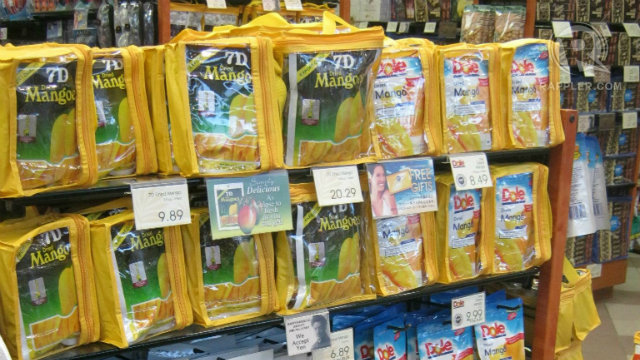SUMMARY
This is AI generated summarization, which may have errors. For context, always refer to the full article.

MANILA, Philippines – Due to complaints on labor rights, the country may lose its General Scheme of Preferences (GSP) eligibility, which allows the preferential entry of US$1 billion worth of exports from the Philippines to the United States.
In a statement on Wednesday, April 10, Philippine Ambassador to the US and former Central Bank Governor Jose L. Cuisia Jr. expressed concerns that the Philippine may lose its GSP eligibility when it comes under review in July.
Under the GSP, the Philippines is allowed to export $1 billion worth of the following items at zero or preferential duty rates:
- cane sugar
- bananas
- air-conditioning machines parts
- wooden tableware and kitchenware
- silver jewelry
- certain women’s or girl’s dresses
- machinery
- dried mangoes, guavas, and mangosteen
“We are addressing the concerns raised, to ensure that we will be able to continue exporting to the US market about $1 billion annually at zero or preferential duty rates,” Cuisia said.
Cuisia said the GSP issue has not moved forward since 2006 despite Manila’s progress in its policy response. This despite the Philippines’ vigilance in assuring the US government of the changes in labor policy.
The government have relayed these messages through the Secretary of Labor and Employment and two Philippine ambassadors in the Public Review of Country Practices of the United States Trade Representative for the past 8 years.
Amcham support
But Cuisia said the Philippines cannot do it alone and urged the American Chamber of Commerce (AmCham) to throw its support to Manila’s efforts to further deepen economic relations with the United States—the country’s third largest trading partner.
Cuisia said supporting the Philippines in this regard would help improve bilateral trade with the United States. Figures from the US Trade Representative stood at $22 billion in 2011, up from the $13 billion recorded in 2009.
“In most endeavors, we cannot do it alone. It is in this regard that I would like to solicit the help of the AmCham, in becoming fellow advocates for stronger US-Philippine ties,” Cuisia said in his presentation before the AmCham General Membership Meeting at the Tower Club in Makati.
“In the face of the US rebalance to Asia, I urge you to advocate with the US government for a stronger economic component,” Cuisia added and said he has observed firsthand how the White House listens to the concerns of its constituents.
Revival of garments industry
Apart from the GSP, Cuisia also sought the support of AmCham for the SAVE Our Industries Act which is now pending at the US Congress as it will be beneficial to improving two-way trade between the Philippines and the US.
Cuisia said the proposed legislation seeks to revive the Philippine garments industry and create a new export market in Asia for American textile by increasing two-way trade in the textile and apparel industry.
“Let your government know that American businesses will benefit from stronger and more equitable economic relations,” Cuisia said. “Your voice will also be effective in advocating for the passage of the SAVE Our Industries Act.”
The SAVE ACT hopes to boost Philippine garments exports to the US to $3 billion and create 600,000 jobs in the process. – with reports from Cai Ordinario/Rappler.com
Add a comment
How does this make you feel?
There are no comments yet. Add your comment to start the conversation.